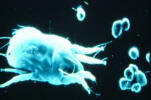Home
A Broad Introduction
Allergy Concepts
Food Issues
Asthma
Rhinitis & Hay Fever
Eczema
Children & Infants
Allergy to Animals
Finding Answers



|
Is there a Special
Gene?
A very allergic family
 Father had had infant feeding problems which faded out in infancy,
and he had no further trouble until aged twenty-nine, when he had
asthma so severe that he was coughing up bronchial casts like worms
in the sputum and he had to have oral steroids for over a year. He
was then referred to the late Professor Pepys who found a strong
skin test reaction to milk, and he was much improved by avoiding
milk products. This was proved at Brompton Hospital by double blind
challenges, and he has been well ever since simply by avoiding all
milk products. Thirty-five years later he still has to avoid milk
because if he eats any cheese or yoghourt he will have asthma in
three hours, and a little later he will produce a bronchial cast
with a peculiar taste. Father had had infant feeding problems which faded out in infancy,
and he had no further trouble until aged twenty-nine, when he had
asthma so severe that he was coughing up bronchial casts like worms
in the sputum and he had to have oral steroids for over a year. He
was then referred to the late Professor Pepys who found a strong
skin test reaction to milk, and he was much improved by avoiding
milk products. This was proved at Brompton Hospital by double blind
challenges, and he has been well ever since simply by avoiding all
milk products. Thirty-five years later he still has to avoid milk
because if he eats any cheese or yoghourt he will have asthma in
three hours, and a little later he will produce a bronchial cast
with a peculiar taste.
Mother had great potential as an opera singer, but discovered by age
eighteen that if she sang in a smoky hall she soon became hoarse and
finally lost her voice. She gave up her singing career and became an
English teacher, but found the the smoke in the staff rooms, or in a
pub with her husband would still affect her voice.
 When aged
fifty-six she also began to react to handling any sort of legumes in
the kitchen, including her husband’s soya milk. The smell of
fresh beans from the garden or handling them would cause acute
conjunctivitis, but they would have no effect after cooking. She
also began to have skin reactions to touching cherries and other
fruits, and her mouth would react to potato, tomato, apples and
other fruits. When aged
fifty-six she also began to react to handling any sort of legumes in
the kitchen, including her husband’s soya milk. The smell of
fresh beans from the garden or handling them would cause acute
conjunctivitis, but they would have no effect after cooking. She
also began to have skin reactions to touching cherries and other
fruits, and her mouth would react to potato, tomato, apples and
other fruits.
Her son had chronic sinus problems which were also found due to
milk, and her daughter has seasonal hay fever from childhood. She
had no other allergic problem until aged twenty-three, when she
developed an intensely itchy rash which was diagnosed by a
dermatologist as ‘ scabies or self-inflicted’ Her case is described
in detail elsewhere, but she turned out to be very allergic to
wheat, to milk like father, and to potato, tomato, and tobacco smoke
like mother.
A RAST test showed very positive specific IgE for Grass pollen,
nettle, and plantain, which explained her hay fever only, and with a
total IgE over twice the maximum normal level. It is very important
to note that the RAST test was negative to wheat, milk, and potato,
which were the major causes of her skin problem, so that if any
reliance had been placed on this scientific laboratory test the
right answers would never have been found.
It is not often realised
that the RAST test is quite unreliable in cases of intolerance, and
the unfortunate patient may be informed that they do not have a food
allergy because the ‘gold standard’ tests were negative.

 A Family of Milk Intolerant Dairy Farmers A Family of Milk Intolerant Dairy Farmers
Mother and her three children were all milk intolerant in various
ways, and were referred one by one over a period of ten years. Their
farm ran a herd of diary cows, and of course milk was freely
available.
 The first to be seen was the eldest son aged four with asthma of six
months duration, with the history that he was breast fed for ten
days, developed eczema on change to formulas, was hyperactive,
seldom slept, and disliked milk! Skin tests and RAST were negative,
but a nasal smear was crowded with eosinophil cells indicating
allergy. Asthma ceased on avoidance of milk, and recurred after
three test feeds which also produced misbehaviour. The first to be seen was the eldest son aged four with asthma of six
months duration, with the history that he was breast fed for ten
days, developed eczema on change to formulas, was hyperactive,
seldom slept, and disliked milk! Skin tests and RAST were negative,
but a nasal smear was crowded with eosinophil cells indicating
allergy. Asthma ceased on avoidance of milk, and recurred after
three test feeds which also produced misbehaviour.
Beef caused
aggressive behaviour, and after a teaspoonful of milk or scrambled
egg he was ‘berserk’ all day. A change to Wysoy, a soya formula
which contained some beef fat, repeatably caused misbehaviour. His
school performance improved remarkably, and the teachers always knew
by his behaviour when he had been cheating. He went to university
had good athletic performance, became a teacher, is now aged forty,
and still cannot tolerate milk products.
Second son was breast fed for six months, with mother avoiding milk
and eggs. Asthma and rhinitis began aged three, and skin tests were
positive for dust mites and cat. He reacted to milk products,
especially to casein in milk substitutes, with wheezing and
hyperactive behaviour up to the age of thirteen, when he was able to
tolerate a little milk. The inhalant allergies never caused a
problem, but could have been misleading.
 Daughter was referred aged eight with seasonal hay fever, but also
had a significant history of vomiting problems in infancy followed by vague stomach aches, occasional sickness and
constipation. With milk avoidance all symptoms vanished, but
recurred after accidental milk ingestion. By her teens she could
tolerate milk, and then got married and had no trouble while
pregnant with the first grandchild. While breast feeding she took
extra milk, and the child had eczema and incessant screaming with
colic for the first three months to such an extent that nobody had
any sleep. I was asked to see him and stopped mother taking milk,
with the result that the whole family slept all night for the first
time. When mother had some clotted cream the colic and eczema
promptly recurred. Daughter was referred aged eight with seasonal hay fever, but also
had a significant history of vomiting problems in infancy followed by vague stomach aches, occasional sickness and
constipation. With milk avoidance all symptoms vanished, but
recurred after accidental milk ingestion. By her teens she could
tolerate milk, and then got married and had no trouble while
pregnant with the first grandchild. While breast feeding she took
extra milk, and the child had eczema and incessant screaming with
colic for the first three months to such an extent that nobody had
any sleep. I was asked to see him and stopped mother taking milk,
with the result that the whole family slept all night for the first
time. When mother had some clotted cream the colic and eczema
promptly recurred.
Mother was the last to seek advice aged fifty with severe asthma of
two years duration. She had not tolerated milk as a child, and as
an adult always felt that ’milk clogged her chest up’ Milk
intolerant patients often express themselves in these words, and
they are often right. Her asthma was severe, requiring oral and then
inhaled steroids for a time, but cleared completely with milk
avoidance. |

